
|
|
Issue Number 10 • Tuesday, Feb. 8, 2022 |
Campus ChampionGrace Schnorr ’21 is a natural leader. A team captain and top scorer for Cortland’s women’s hockey team, she’s tenacious on the ice and focused on post-season play. Grace, who is pursuing her master’s in exercise science, led the Red Dragons in this past Saturday’s National Girls and Women in Sports Day game against No. 2 nationally ranked SUNY Plattsburgh at Upstate Medical University Arena in Syracuse. The day appreciates the achievements of female coaches and female athletes and acknowledges the role they play to help unlock the endless potential of women. Tuesday, Feb. 8Black History Month Performance: “Black History Through Poetry Slam,” Moffett Center, first floor forum, 5 p.m. Dowd Gallery Documentary Screening: “Why Art Education?” series of shorts, Dowd Gallery, 5 p.m. Let’s Get Professional: Information on how to dress for an interview, interview tips, Corey Union, Rooms 207-208, 6:30 to 7:30 p.m. Register on Cortland Connect Wednesday, Feb. 9Black History Month Performance: “Black Music Matters,” presented by Edward Moore, Performing Arts Department, Dowd Fine Arts Center, Room 110, 12:30 p.m. Workshop: Understanding and Advocating for Racial Justice, Corey Union Voice Office, 4 to 6 p.m. Register Opening Reception: Faculty Biennial 2022, Dowd Gallery, Dowd Fine Arts Center, 5 to 7:30 p.m. Black History Month Living Museum: Living Museum highlighting different figures in black history, Corey Union Function Room, 6 to 7 p.m. Wellness Wednesday: “Stop the Beef,” tips to communicate and respond to situations in a productive way to avoid conflict, Corey Union Exhibition Lounge, 6 to 6:30 p.m. Discussion: Systematic Racism in America, online via Webex, 6:30 to 8:30 p.m. RSVP on Cortland Connect. Transfer Trivia: Student Life Center, Room 1104, 7 p.m. Thursday, Feb. 10Black History Month Lecture: “My Black Students Think I'm White: Colorblindness and the Negotiation of Racial Ideology in Urban Schools,” Moffett Center, first floor forum, 4:30 p.m. Dowd Gallery Artist’s Talk: Faculty Biennial, in-person event, Dowd Gallery, 5 p.m. Career Services Workshop: Intro to Handshake and LinkedIn, online via Handshake, 5 to 6 p.m. Discussion: Let’s Talk About Gun Violence, Corey Union, Rooms 207-208, 6:30 to 7:30 p.m. RSVP on Cortland Connect Cortland Nites: Stuff a Bear, Corey Union Function Room, 8 to 11 p.m. Saturday, Feb. 12Black History Month Event: SUNY Cortland NAACP Founders Day Brunch and Black Excellence Movies, Corey Union Exhibition Lounge, 11 a.m. and 2:30 p.m. Monday, Feb. 14Black History Month Lecture: “Mitigating Intellectual Hegemony,” presented by Michael Tillotson, Africana Studies Department, Moffett Center first floor forum, 7 p.m. Tuesday, Feb. 15Black History Month Presentation: “Rodney Reed: An Innocent Man on Death Row,” Moffett Center, first floor forum, 4:30 p.m. Open Mic Night: Corey Union first floor, 7 p.m. Wednesday, Feb. 16Study Abroad Fair: Corey Union lower lobby, 11 a.m. to 2 p.m. Union Matters Lunch Meeting: Chapter Budget Vote 2022, Corey Union Exhibition Lounge, noon to 1 p.m., RSVP to [email protected] Black History Month Sandwich Seminar: “Kwame Gyekye and the Communitarian Ethics of COVID Denial,” Old Main Colloquium, 12:30 to 1:30 p.m. Dowd Gallery Artist's Talk: Faculty Biennial 2022, Art and Art History Department, Dowd Gallery, 5 p.m. Teacher Certification Requirements Overview: Presented by Career Services, online via Handshake, 6 to 7 p.m. Thursday, Feb. 17Black History Month Sandwich Seminar: "Afro-Futurism: From Funk to Black Panther Taking Back the Future," Old Main Colloquium, noon to 1 p.m. Friday, Feb. 18Comedy Hypnosis Jim Wand: Corey Union Exhibition Lounge, 6 p.m. Monday, Feb. 21Black History Month Workshop: “Cortland Has a Dream (Building a Leaderful Movement: An Organizing Workshop,” panel presentation, Corey Union Function Room, 5:30 to 7 p.m. Tuesday, Feb. 22Black History Month Student Presentations: “Early Racialized Philosophies of People of African Descent” and “Predictive Policing: History and Methods,” presented by Africana studies students Alfred Robertson and Daniel Reischer, Moffett Center, first floor forum, 4:30 p.m. Dowd Gallery Talk: Ask a Curator Q&A, online via Webex, 5 p.m.
|
SUNY Cortland at the Super Bowl02/09/2022When Super Bowl LVI kicks off at SoFi Stadium in Los Angeles, the Cincinnati Bengals and Los Angeles Rams will compete for the Lombardi Trophy on the field — and several Cortland Red Dragons will play key roles too. They include:
Red Dragon connections to marquee sporting events have become common, given SUNY Cortland’s reputations in coaching, sport management, athletic training, exercise science and many other disciplines. Several of those strengths will be on display this Super Bowl Sunday. Dan Pitcher ’10, M ’11 The ultimate scholar-athlete during his Cortland days, the former quarterback was a finalist for the 2011 Gagliardi Trophy, Division III’s national player of the year award, as well as a first team Academic All-American with a grade point average surpassing 4.0. 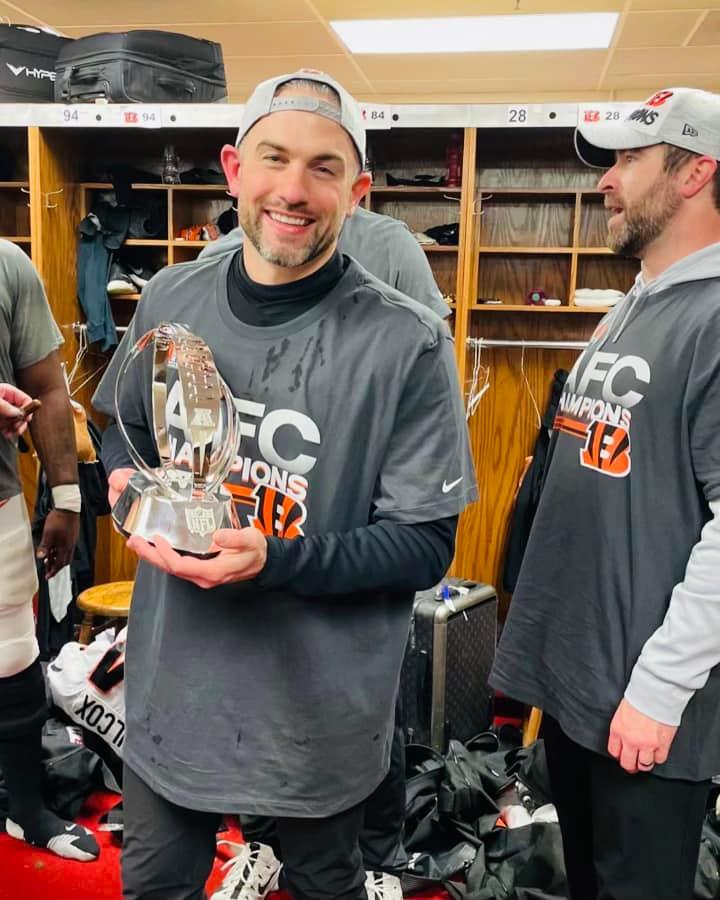 Pitcher has served as Cincinnati’s quarterbacks coach for the past two seasons and an assistant on staff for six years overall. His 10-year NFL career started with the Indianapolis Colts in their scouting area. He is considered one of the Bengals’ bright young offensive minds given his work with second-year signal-caller Burrow. During Super Bowl media availability on Feb. 7, Burrow offered high praise for Pitcher. “I couldn’t have asked for a better quarterbacks coach,” Burrow said, according to the Bengals’ official website. “When I need to vent a little bit, he sits there and listens to me. It’s good to have a coach that isn’t going to put you down or lecture you all the time. Sometimes coaches have to listen to players vent a little bit. He not only does that, but if I have a question, he comes with an answer right on the spot. I couldn’t ask for a better situation.” Pitcher was born and raised in Cortland and still maintains strong ties to the community through his family. Read more about his path to the Super Bowl. Katie Keenan ’05, M ’10 The NFL’s biggest event of the year is in good hands with a former SUNY Cortland sport management major serving as the league’s senior director of event operations. She was promoted to the position in July and recently featured in a Los Angeles Business Journal profile. 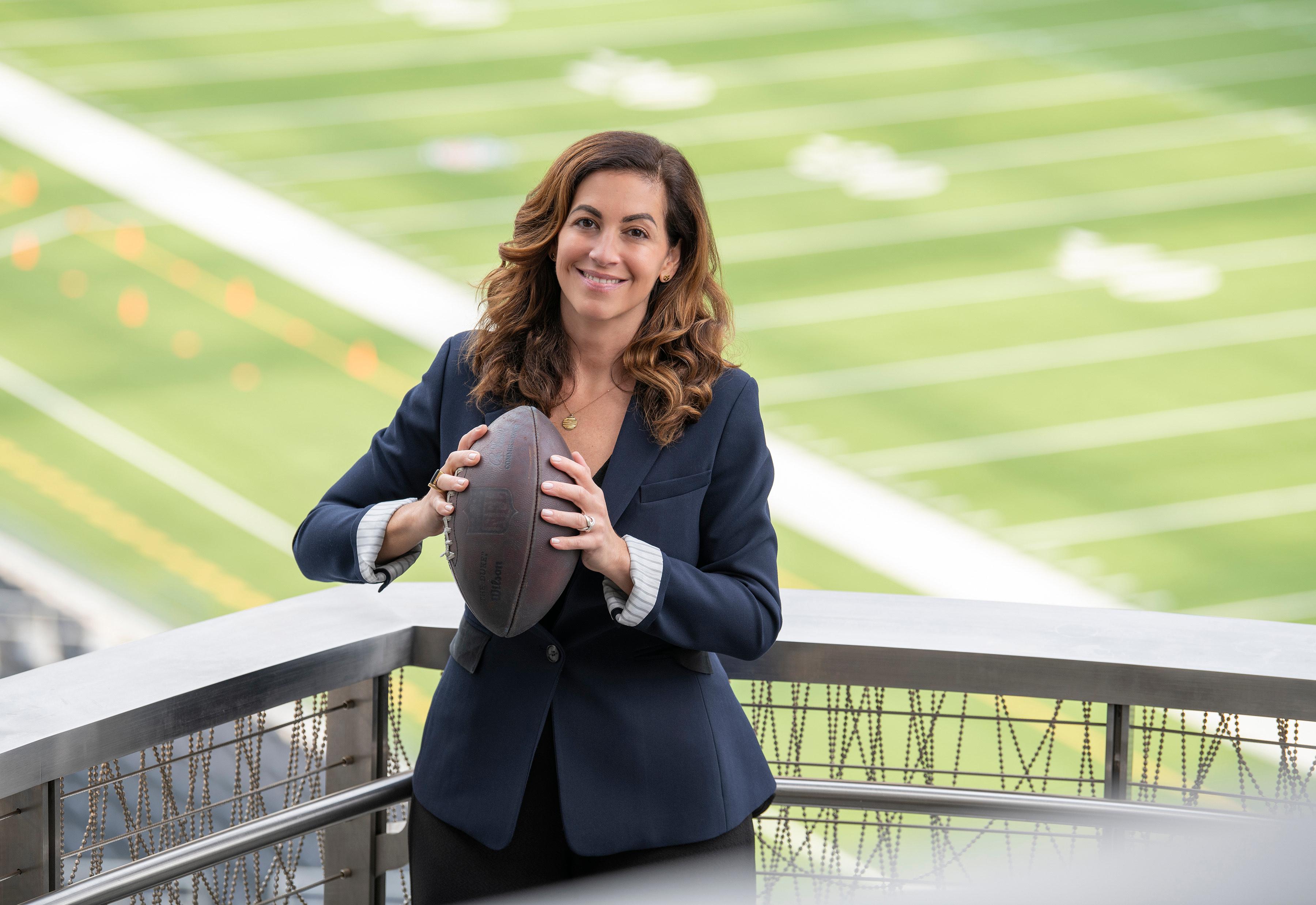 Keenan will help lead the coordination of many logistical details at the first Super Bowl in Los Angeles in nearly 30 years — from broadcast elements to access credentials to partnerships with businesses providing signage, catering, restrooms and transportation. Producing the six-hour event at brand-new SoFi Stadium requires many months of planning and a massive “group effort.” This year will mark Keenan’s 10th Super Bowl after working her way up through multiple positions within the most popular sports league in the U.S. The Super Bowl marks just one of the events that she works on throughout the year. They include the NFL Draft, the league’s Kickoff event, the International Series and several others. Keenan’s more than 16-year career in professional sports can be attributed to her work ethic and her drive to seize opportunities from a young age. In addition to earning two degrees from SUNY Cortland, she pursued a minor in Spanish as an undergraduate, which helped land an internship with the International Paralympic Committee. Keenan remains connected to Cortland through the university’s Sport Management Advisory Board. Read more about her in this 2016 alumni feature. Sport management majors Four undergraduate sport management majors took a cross-country flight for a weeklong immersive experience in Los Angeles. The trip started with seminars at several pro sports stadiums and it will conclude with a four-day work experience at Super Bowl-related events. 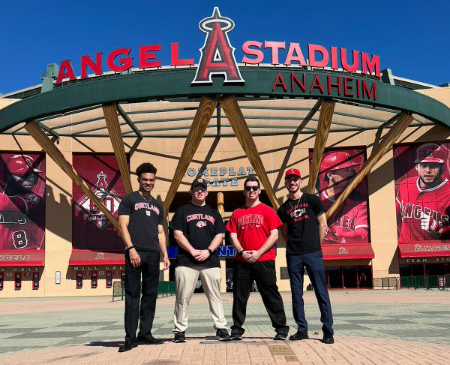 The student group included Andrew Celio, Kyle Celio, Theo Riley and Joe Valerino. During the early portion of their trip, students heard from industry professionals at Dodgers Stadium, home of MLB’s Los Angeles Dodgers; Angel Stadium of Anaheim, home of MLB’s Los Angeles Angels; and Crypto.com Arena, home of various teams including the NBA’s Los Angeles Lakers, the NHL’s Los Angeles Kings and the WNBA’s Los Angeles Sparks. They’ll work at various events tied to the Super Bowl from Thursday through Sunday. Their journey was coordinated by Living Sport, an organization that plans domestic and international sports industry trips for current college students and young professionals. Lawrence Brady, an instructor and internship coordinator in the Sport Management Department, connected the students with Daniel Koch ’21, who worked at Super Bowl LV in Tampa Bay through Living Sport. Koch is now guest experience coordinator for the NFL’s Jacksonville Jaguars. “I love it when students are willing to take those chances, bet on themselves and engage with opportunities like this,” said Ryan Vooris ’08, associate professor and chair of the Sport Management Department. “It’s not every day you get to work at the Super Bowl. “Talk about a résumé-builder.” History professors revisiting the Gilded Age02/04/2022A pair of SUNY Cortland historians have received a $143,000 federal grant to recruit a team of SUNY experts on America’s Gilded Age and Progressive Era in an effort to replace how these pivotal chapters in the nation’s history are understood and taught. To be clear, they are not replacing current history by tossing it out and inserting something new. They aim to re-“place” the eras, expand the scholarship of the period in the late 19th and early 20th centuries beyond the major cities and timeframe and present it in a wider context. “Most of the way that that (era) gets told in history textbooks is by looking at cities and what’s happening in urban America, and mostly on the East Coast,” said Randi Storch, a former chair of SUNY Cortland’s History Department and a SUNY Distinguished Teaching Professor. “Those were important lenses, but maybe they are not the best or only lenses. There is so much scholarship broadening, deepening and expanding the way that historians think about this period of time.” 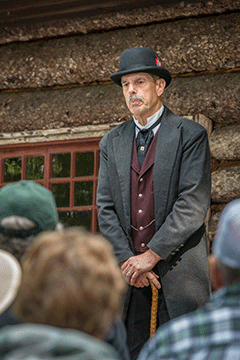 She and Kevin Sheets, who currently chairs SUNY Cortland’s History Department, are the principal co-investigators on a new two-year study to revise how this American historical period is viewed and taught in schools and colleges, thanks to a $143,000 grant from the National Endowment for the Humanities (NEH). The professors plan to collaborate with SUNY colleagues to reach as many as 2,000 SUNY students statewide with revised coursework within five years. The NEH special projects grant initiative is called “Re-Placing the Gilded Age and Progressive Era: A SUNY Faculty Study Group Transforms the Teaching and Learning of America’s Pivotal Period.” “We are ‘replacing’ the Gilded Age/Progressive era with the idea of ‘place,’” Storch said. “Shouldn’t we be thinking about it outside of New York City and the eastern seaboard where it traditionally is thought about, when there were so many other things that were shaping the American experience in this period of time?” Sheets and Storch are recruiting 20 history scholars at SUNY’s comprehensive colleges. The new network of educators will immerse themselves in the period from the 1870s to the 1920s during a weeklong workshop this summer in a remote Adirondack outpost where Gilded Age and Progressive Era history was likely made: the Huntington Memorial Camp at William H. Parks Family Center for Environmental and Outdoor Education. SUNY Cortland has owned and carefully preserved the first Great Camp of the Adirondacks, built by industrialist scion William West Durant and later sold to railroad magnate Collis P. Huntington, since 1947. Generations of SUNY Cortland students from majors ranging from physical education to geographic information systems, have benefitted from educational experiences at the center. Many historians are shifting study of this roughly half century of seismic political, economic and social transformation away from the meatpacking plants of Chicago, the tenements of New York City and the steel mills of Pittsburgh. They’re looking to more rural locales, say, New York state’s Adirondack Park, summer playground of the country’s oil, steel, timber and railroad multi-millionaires. “To fully understand the story, you need of think about the relationship between different places,” Sheets said. “The obvious example for us to start is our camp. We think of the Adirondacks as a sealed-off wilderness. But New York City has a relationship with the Adirondacks. “Its water source, the Hudson River, originated in the Adirondacks. The timber that built the buildings of Manhattan, that timber originated in the forests of the Adirondacks. There are relationships between these geographies that are important to understand. If you only focus on the urban story you miss that dynamic interrelationship between those places.” The study group’s discussions on when and where the Gilded Age and Progressive Era really occurred will be led by two guest scholars, Rebecca Edwards of Vassar College and Kristin Hoganson of University of Illinois at Urbana-Champaign. Edwards is the author of books on gender and politics in the Gilded Age and on reinterpreting the Gilded Age that are frequently used in colleges and graduate classes. 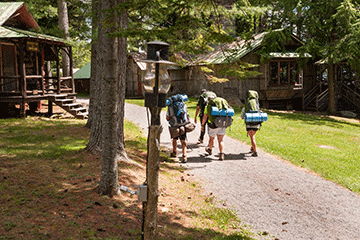 Hoganson is interested in imperialism and gender and consumption. “She makes the argument that Americans and American consumers, and particularly female consumers, were consuming a global marketplace of goods,” Sheets said. In Hoganson’s latest book, The Heartland, she looks at geography and borders and the relationship between different geographies, according to Sheets. “That’s kind of the heart of what we’re trying to do in the grant: to get people to think about the Gilded Age and Progressive Era as a place, as a moment in time that doesn’t just happen in America’s urban spaces,” Sheets said. Contemporary historians must look at many different people and examine international developments and transnational movement of people and ideas. “Their stories help us reframe the way that we are thinking about this period of time,” Storch said. “There are just so many more voices and they’re in so many different places than how historians have traditionally thought about this moment in time.” After their Adirondack retreat, Sheets and Storch will meet regularly with their SUNY colleagues as they develop new or revised courses and lesson plans to be taught by the 2023-24 academic year. The SUNY Cortland professors will also produce a book that compiles their findings. Around June 2023, Sheets and Storch will draft the book’s introduction and begin revising authors’ submissions, assisted by SUNY Cortland graduate in history Kaycie Haller ’19, now a Ph.D. candidate at SUNY Albany. The forthcoming manuscript Re-placing the Gilded Age and Progressive Erashould go to press the following summer. Sheets and Storch will wrap up the project by presenting the results at a national conference. They also plan to host a virtual professional development webinar, enabling select project participants to connect directly with high school and community college instructors across New York state and beyond. Sheets and Storch have managed more than $2.1 million in NEH grants for a more than half dozen summer institute projects geared for secondary schoolteachers using place-based learning to enhance the teaching of the Gilded Age and Progressive Era. Between 2004 and 2014, Sheets ran American history education projects for teachers through Board of Cooperative Educational Services providers with total support of $803,000 from the U.S. Department of Education. Capture the MomentBlack History Month at SUNY Cortland includes student-led efforts from the Black Student Union, SUNY Cortland NAACP, Know Your Roots, the Pan African Student Association and the Student Government Association. All SUNY Cortland community members are encouraged to explore the journey of Black Americans, celebrate their achievements and work toward peace, justice and inclusion. A complete list of more than 20 February events can be found online at cortland.edu. In Other NewsUpdate on a new approach to surveillance testingDear faculty and staff,
I want to share some news about the university’s approach to surveillance testing for COVID-19.
On Monday, Feb. 14, we will begin to better align our process with guidelines from SUNY system administration. The university will start to use rapid tests instead of PCR tests and test a sample pool of 10 percent of our vaccinated employees every two weeks.
Employees who have not provided proof of vaccination still must test weekly.
Surveillance testing is one component of testing. The increased availability of rapid tests gives us all the opportunity to test frequently on our own. Although we are testing a smaller population of employees each week, shifting to rapid tests will allow those who test positive to isolate quickly, which will help to decrease community spread. Finally, this change will align our employee surveillance testing program with the surveillance testing program we have been using for students since the start of this academic year.
Specific details on the process, including how to return PCR test kits, will be emailed to you from Human Resources later this week. We will also host a campus update via Webex on Thursday, Feb. 10 from 10 to 11 a.m. Employees can submit questions ahead of time using an online form. The meeting will be recorded.
If you feel ill, please stay home and get tested. If you need a test, remember that any member of the campus community may use the state-run testing site at the Carl A. "Chugger" Davis Building at the Stadium Complex from 8:30 a.m. to 4 p.m. on weekdays. Schedule an appointment online.
Our student surveillance testing process will also shift to using rapid tests. The frequency of student testing will remain unchanged. You may remind students to contact Student Health Service at 607-753-4811 to schedule an appointment.
Surveillance testing remains one of many pillars in our defense against COVID-19 in addition to face coverings, vaccines and boosters. Please stay safe and follow the details that will be provided by Human Resources.
All the best,
Erik J. Bitterbaum
President
Black History Month 2022SUNY Cortland will host two dozen events throughout Black History Month. These events include presentations, panel discussions, podcasts and more. Attendees are asked to follow SUNY Cortland’s COVID-19 safety policies, including the wearing of face coverings in all indoor spaces. Please refer to the university calendar for updates throughout February. Events include:
Members of the campus community are also encouraged to participate in the 21-day Anti-Racism challenge at any time. The challenge is an opportunity for individuals to learn, grow and foster awareness, compassion and understanding. Co-sponsorships and funding for Black History Month events were provided by the President’s Office, the Institutional Equity and Inclusion Office, the School of Arts and Sciences, the School of Education, the School of Professional Studies, the Africana Studies Department, the Political Science Department, the Performing Arts Department, the Sociology/Anthropology Department, the Multicultural Life and Diversity Office, the President’s Council on Inclusive Excellence, the Campus Artist and Lecture Series, the Educational Opportunity Program, Student Government Association, the Know Your Roots-Africana Studies Association, SUNY Cortland NAACP, the Black Student Union and the Pan African Student Association. For more information or questions, please contact Distinguished Teaching Professor Seth Asumah, chair of the Africana Studies Department, at 607-753-2064. First-year student lights flame at New York’s Winter GamesCompetitive figure skating lit a fire inside Amanda Demmerle when she was young. Now, thanks to her perseverance in the sport, community service and effort in the classroom, the SUNY Cortland first-year student will light the flaming cauldron that marks the official start of the Empire State Winter Games (ESWG) Thursday, Feb. 3 in Lake Placid, N.Y. Demmerle, from Camillus, N.Y., will be honored as the ESWG’s Athlete of the Year in recognition of her character off the ice. With approximately 2,000 athletes expected to compete in a four-day span, the games are considered the largest multi-sport amateur winter sporting event in North America. The kick-off also takes place the same day as the opening ceremonies of the 2022 Winter Olympics in Beijing, halfway around the world. “The feeling is surreal,” said Demmerle, a dual major in adolescence education: social studies and history who has competed regularly in Lake Placid at the ESWG during the past decade. 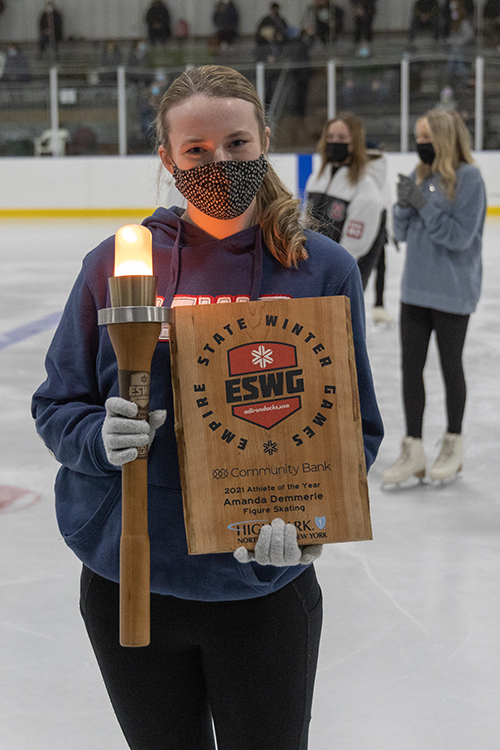 Demmerle, who has tested through the gold level in multiple figure skating categories, will compete in two events this year. She will look to add to an ESWG awards collection that includes first- and third-place honors from past years. Individual awards at the games are presented across several divisions for first through third place. “With most (figure skating) competitions, it’s only figure skaters. You don’t get to interact with athletes from other sports,” she said. “When you go to the Empire State Winter Games, there’s all of these other sports and hundreds of people and this giant parade. You get to hear their stories because we’re all there together.” It wasn’t Demmerle’s skating accolades but her story of dedication that resonated with a panel of judges in 2020. She has competed through asthma and several injuries in recent years that included ankle tendinitis and a labral tear in her hip. She was selected as the athlete of the year for figure skating out of more than 500 entries two years ago. Each sport’s winning athlete then submitted a video introduction. An online voting contest selected Demmerle as the overall winner. “I like to think the reason I won is my love and support for the community — not just the sport, but everything outside of it as well,” said Demmerle, who skates four days each week and spends just as much time teaching young skaters and working at an after-school program. She is a member of the Cortland Figure Skating Club, which is made up of local skaters from across Cortland County and Central New York. Demmerle joined the group several years ago — long before she attended SUNY Cortland — because its home ice at the J.M. McDonald Sports Complex offers the ability to skate indoors in the summer. She said her teammates and coaches are like a second family to her. Her mother, Jaime Hummell Demmerle ’91, also provided a strong connection to Cortland. 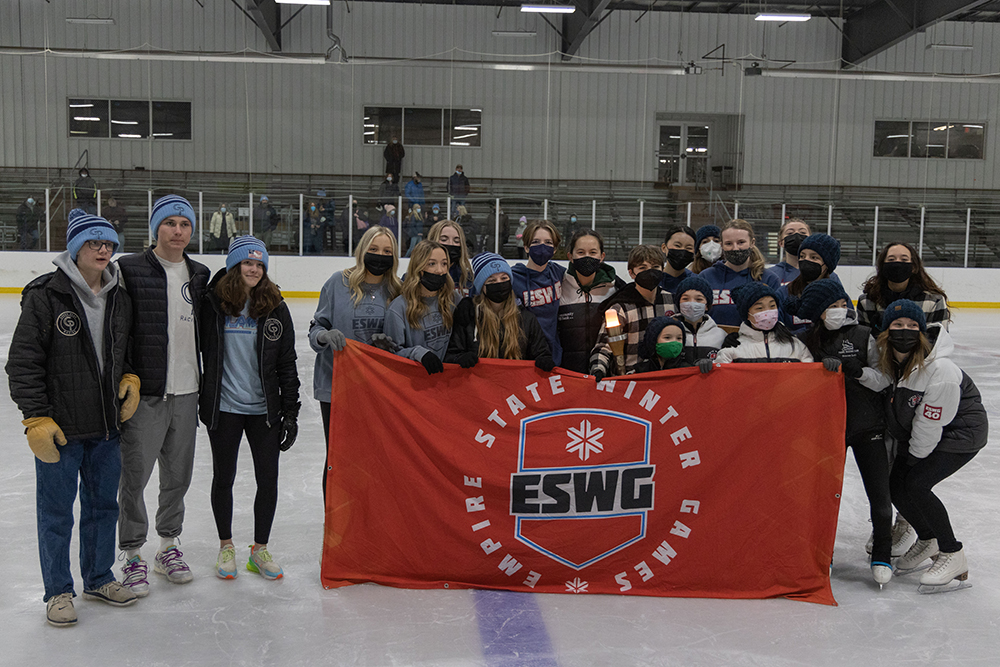 “I think part of it is I had such a great experience at Cortland,” said Jaime Demmerle, noting that she’d often point out houses from her college days after trips to figure skating practices. “It was one of those things where everything aligned.” Many figure skating club teammates, family members, law enforcement agencies and local leaders, including SUNY Cortland President Erik J. Bitterbaum, joined Demmerle when the ESWG torch relay passed through Cortland Jan. 31 as part of a six-day, 700-mile journey. “As a parent, you think of the quote: ‘Success might not be what I do in life but who I raise,’” Jaime Demmerle said. “I was just so proud of her because she works so hard on and off of the ice.” Outside of training and competition, food and clothing drives are staples of the Cortland Figure Skating Club. The close-knit organization also offered Amanda Demmerle early experience as a volunteer teacher and coach through a “learn to skate” program. “I’ve been able to see how young skaters learn,” the aspiring teacher said. As a student at West Genesee High School, Demmerle was invited to join national honor societies for academics, dance and the Spanish language in addition to earning a Seal of Biliteracy. She applied to SUNY Cortland because of the university’s reputation in teacher education and was awarded a scholarship for her civic engagement. “I applied to Cortland to become a social studies teacher and I knew when I applied that there was a lot out there that I wanted to get done,” she said, noting that she enjoys learning about history through travel and hopes to study abroad in Cork, Ireland in the future. But before that, she’ll travel to Lake Placid — a winter sports destination with a rich history of its own. “Lake Placid is amazing, especially because of the connection to the Winter Olympics,” said Demmerle, referring to the Adirondack village’s hosting of the 1932 and 1980 games. “There’s just this magical feeling because you get to compete in the same place where all of these great moments happened.” More Red Dragon connections to the Empire State Winter Games In addition to Amanda Demmerle, ESWG competitors with close SUNY Cortland ties include Isabelle and Lincoln Woodward. Their mother, Melanie Woodward, is the university’s associate director of human resources and affirmation action officer. Grant supports mobile archive to document diversityA new grant will allow SUNY Cortland Memorial Library’s Archives and Special Collections and the Cortland County Historical Society to partner in documenting the local community. The goal is to remember the histories of people from marginalized and underserved populations on the campus and throughout greater Cortland. The $7,000 grant, from the Institute of Museum and Library Services (IMLS) and the American Rescue Plan Act (ARPA), will fund a project called “The People’s Record: Using a mobile archive to document and preserve Cortland’s diverse stories.” Memorial Library’s Archives and Special Collections and the Cortland County Historical Society will host a series of pop-up archive sites on and off campus to begin documenting and recording the memories of people from these populations. Community members will have the opportunity to bring in materials for donation or to have those materials scanned into the digital archives and maintain original copies. Materials may include photographs, scrapbooks, family histories or other documents. Pop-up archive events will begin on Tuesday, Feb. 15 in Memorial Library and are scheduled once per month through the spring semester. Individuals may also schedule alternate virtual or private sessions. Pop-up events for Spring 2022 include:
Organizers intend the project to be an inclusive opportunity for all participants to record meaningful conversations, preserve memories and give the community a public voice in the historical record. Stories may relate to family history, occupations, social justice, education or COVID-19, among many possible topics. The project will be led by Jeremy Pekarek, SUNY Cortland’s archivist and instructional services librarian, and Tabitha Scoville, director of the Cortland County Historical Society. SUNY Cortland history majors MacKenzie Guernsey and Caleb Blaise are working as interns and will receive assistance on interview planning and implementation from Associate Professor Evan Faulkenbury. Pekarek shared a quote from historian Howard Zinn, which appeared in the Midwestern Archivist in 1977, on the importance of documenting history from marginalized and underserved communities. “We learn most about the rich, not the poor,” Zinn wrote. “The successful, not the failures; the old, not the young; the politically active, not the politically alienated; men, not women; white, not black; free people rather than prisoners; civilians rather than soldiers; officers, rather than enlisted men.” Scanned materials and interviews will be preserved through SUNY Cortland’s Digital Commons and New York Heritage, an online portal for learning about the people, places and events that made New York state. The project is sponsored by the Cortland County Historical Society, SUNY Cortland Memorial Library, South Central Regional Library Council and the university’s Cultural and Intellectual Climate Committee (CICC). For more information, contact Pekarek or Scoville. Participants are reminded to follow all COVID-19 safety policies on the SUNY Cortland campus, including wearing face coverings at all times while indoors. Details are available on the COVID-19 Safety Information page. How communities recover from catastropheA “mega catastrophe” is a disaster of almost unimaginable proportions. Think, for example, of 2004’s Indian Ocean tsunami, which killed an estimated 227,898 people in 14 countries, making it one of the deadliest cataclysms in recorded history. The plight of the affected people prompted a worldwide humanitarian response, with donations totaling more than $14 billion U.S. dollars. Elizabeth Bittel, an assistant professor of sociology at SUNY Cortland, specializes in studying how humans endure this kind of massive devastation, whether from wars or the “natural” elements, which scientists are blaming for more than a few disasters. “As we move toward a more unstable global climate with an increased risk for ecological destruction, lessons from complex humanitarian emergencies are more prescient than ever,” Bittel said. 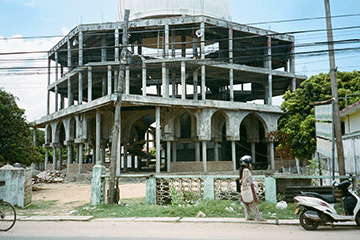 Bittel will lecture on “(Re)Making Home on Shifting Sands: Lessons from Post-Catastrophe Corrosive Communities” on Wednesday, Feb. 23, at SUNY Cortland. Her talk, which will take place at 4:30 p.m. in Moffett Center, Room 115, continues the 2021-22 Rozanne M. Brooks Lecture Series of talks or poster sessions at SUNY Cortland, which this academic year focuses on the theme of “The Culture of Extremes.” A reception to welcome Bittel will start at 4 p.m. in the Rozanne M. Brooks Museum, Moffett Center, Room 116. The Brooks Museum lectures and receptions are free. Due to continued health and safety concerns surrounding the pandemic, members of the public are not invited. Seating will be limited and cannot be exceeded. The presentations all take place on Wednesdays and begin at 4:30 p.m. in Moffett Center, Room 115. Events in the series are subject to change. Bittel, who also serves as a visiting scholar in the South Asia Program at Cornell University, has focused her scholarship on the sociology of environment, social dimensions of disasters and hazards, environmental justice and ethnographic methods and Sri Lanka. 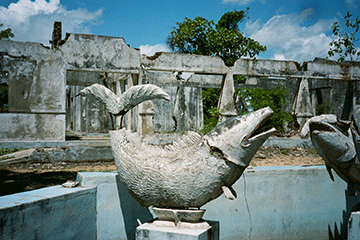 Lately she has used ethnographic data she collected from communities in the Batticaloa region of Sri Lanka, one of the hardest-hit countries by the Indian Ocean tsunami, to study how its people have experienced recovery some 18 years after the mega earthquake-linked disaster. Sri Lankans also endured on- and off-again violent civil conflict between the Sinhalese government and Tamil separatists for nearly 30 years, with the war officially ending in 2009. Bittel has observed how the process of rebuilding physical infrastructure is shaped by actors and institutions that co-produce social cohesion or corrosion, both of which flourish throughout the lifecycle of disasters. So communities pulling together or dividing can make the difference between a successful or an unsuccessful recovery. “This work interrogates how power flows through institutions and communities seeking to rebuild their homes on shifting sands,” Bittel said of her ongoing work to theorize “disaster recovery.” “And, in doing so, critiques the popular ‘build back better,’ resilient-community narrative by troubling our understandings of what exactly ‘recovery’ is, who it is for, and how it happens.” Born in Key West, Bittel was raised in South Florida and earned a Bachelor of Arts in Sociology and Social Welfare, summa cum laude, at the University of North Florida in Jacksonville. While earning a Ph.D. in sociology at the University of Colorado Boulder (UCB) in 2019, she focused her research on environmental sociology and worked as a graduate research assistant and the internship coordinator at the UBC’s Natural Hazards Center at the Institute of Behavioral Science. 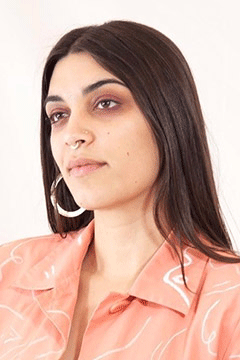 In 2017, she was awarded a Foreign Language and Area Studies Fellowship from the American Institute for Indian Studies and Institute for Regional Studies at University of Wisconsin to attend a Tamil language intensive institute in Madurai, India. Bittel also received an American Institute for Sri Lankan Studies Curriculum Development Grant: Teaching About the 2004 Tsunami. Bittel has developed a teaching module for the American Institute for Sri Lankan Studies titled “Teaching About the 2004 Tsunami.” She co-authored a book chapter on how children offered a bottom-up response after Hurricane Katrina for a forthcoming book The Potential for Bottom-Up Responses to Crisis (London: Palgrave Macmillan). The “Culture of Extremes” series addresses how in the last couple years, America and the rest of the world have been wracked by extremes that include political brinksmanship, apocalyptic weather events, deadly pandemic, economic collapse and social upheaval. Two additional talks will be announced later this spring. The 2021-22 Brooks Lecture Series is sponsored by a grant from the Cortland College Foundation, the Sociology/Anthropology Department and the President’s Office. For more information, contact Brooks Museum director and SUNY Distinguished Professor Sharon Steadman at 607-753-2308.
Town Hall to discuss New York Health ActSUNY Cortland will host a virtual town hall on the potential benefits and drawbacks of a new state bill that would create a universal, single-payer health care system, on Thursday, Feb. 24. Presented by the university’s Institute for Civic Engagement, the panel discussion of the New York Health Act will take place from 4 to 5 p.m. The town hall is free and open to the public. New York State Assembly member Anna Kelles, who represents the 125th District, which includes the SUNY Cortland campus, as well as the southwest part of Cortland County and all of Tompkins County, will update the audience on the progress of the proposed Assembly bill she co-sponsored on March 8, 2021, which closely matches legislation put forward in the New York State Senate. 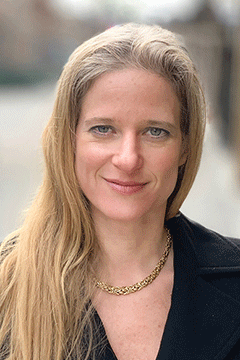 Senior English major Hailie Addison, an Action Team intern with the institute for four semesters, will briefly introduce Kelles, who will describe the plan’s prospective benefits and address concerns about the act during a question-and-answer period following her talk, which is expected to last 30 to 40 minutes. John Suarez, who directs the institute, coordinates service-learning at Cortland, and serves as co-managing editor of the Journal of the Scholarship of Engagement, is prepared to pose critical questions regarding the legislation if necessary. “The New York Health Act (NYHA) will save money, eliminate insurance premiums and out-of-pocket costs, prioritize preventative care and free workers to do the job of their choosing, change jobs or start businesses,” said Kelles, a public health educator in Ithaca, N.Y., with a doctorate in nutritional epidemiology. “For the first time ever, 95% of New Yorkers have health insurance, but more than 1 million of us are still uninsured, and many more are underinsured and paying far more than they can afford,” Kelles said. “Under the New York Health Act, by pulling insurance companies out of our healthcare system, we will put the people’s needs first. “I welcome the opportunity to discuss the piece of legislation with my constituents,” she said. For more information about the New York Health Act, visit Kelles’ website. Daniel Koerner, a staff member to New York State Senator Peter Oberacker, a Republican and Conservative who represents the 51st Senate District, will attend the discussion but not participate. Oberacker’s nine-county territory includes urban and rural parts of Cortland County. 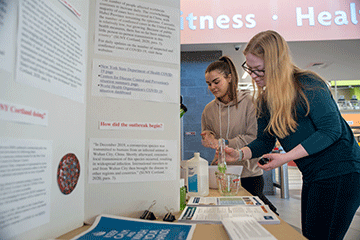 New York State Senator Pam Helming, whose 54th District abuts Cortland County, was unable to attend. Assembly Member John Lemondes, the Republican, Conservative, and Independence Assemblyman whose four-county Assembly District 126 covers part of Cortland County, does not plan to attend. He stated the following position on the proposed legislation: “Removing the option for hundreds of thousands of workers to choose their own healthcare is the wrong move, no matter what options the state offers. The constant drive towards a one-size-fits-all solution that Albany Democrats like to push, which are more often than not created with a New York City focus in mind, inhibits individuals from being as flexible as they need with their coverage. Jobs would be cut by the thousands and taxes raised by just as much, and it’s not an expense New York can afford, financially or otherwise.” For more information, contact Suarez. Students model European UnionThe country of Austria’s official coat of arms depicts a fierce black eagle. But for three days last month, it was represented by Red Dragons. Three SUNY Cortland students role-played as the nation’s ministers and diplomats in a simulated discussion of real-world issues among European Union countries as participants in Global Model European Union (MEU) 2022. A recent SUNY Cortland graduate represented Lithuania in the same simulation. This year’s Global MEU, held from Jan. 13 to 15, attracted 80 participants from 14 universities in seven countries: Belgium, Bulgaria, France, Germany, Morocco, Romania and the U.S. The annual hands-on experiment in governmental negotiation and diplomacy, which traditionally has involved participants traveling to either New York City or Brussels, was held virtually for a second year due to the COVID-19 pandemic. 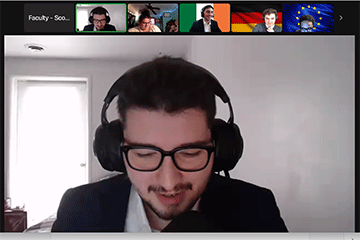 Nevertheless, the SUNY Cortland contingent thrived and captured accolades after the simulation concluded.
“I’m actually looking forward to getting my master’s in diplomacy,” said Binjakaj, an international student who during 2020-21 academic year served as vice president of SUNY Cortland’s Student Government Association. “I think it’s definitely one of my main skills, my main areas. I’m definitely a very cold-blooded person, meaning in the Albanian sense that I’m actually a very calm and collected person. I’m very diplomatic. I very much value collaboration, talks and bargaining. I really don’t like conflict.” Born in Italy and raised in Albania, at SUNY Cortland Binjakaj was inspired by this experience to add political science as a dual major with business economics, and will graduate next spring with a minor in computer applications and concentration in financial management.  “I want to increase the participation of students in other majors,” he said. “Obviously it’s particularly oriented for students in International Studies. But I don’t see why a student who’s majoring in business economics or political science or even someone working on environmental studies cannot do this. Because we have all those four committees, and the European Commission and the EU is a body that pretty much takes experts from all fields.” Toribio, a senior international studies and political science major from Freeport, N.Y., has four Global MEU simulations under her belt; New York City in 2019, Brussels in 2020 and online the past two cycles. “Working remotely the last two years is definitely a different experience, but academically I think over the four years it’s consistently the same: you learn something new,” she said. “Being the foreign affairs minister for Austria was a different role than what I’ve done in the past,” she said. “All four years I’ve actually had different roles. “Although you learn more on European politics, one of the plusses of this conference is you really get to dive deep into one country in particular,” Toribio said. “For example, I really had no idea Austria was going through so many political changes. It was just a real learning experience for me.” The class project has inspired her to seek her dual citizenship from the Dominican Republic and a future job in its embassy. Meanwhile, she will pursue graduate studies in public policy. “The Model European Union shaped my decision to add political science as a major a year ago,” Toribio said. “It made me realize I could do so much more.” As head of Austria’s government, Alvisi, a senior international studies major with dual Italian and American citizenship, found this year’s MEU particularly challenging for two reasons. For one, Austria has had two new chancellor’s within two months due to Chancellor Kurz’ resignation in October 2021.  “I would usually think ‘What would the chancellor say on this matter?,’ but when there are three different chancellors in such a short amount of time, it is definitely harder to tell,” she said. For another, during her Head of Government chat room discussions about the Russia-Ukraine conflict, she needed to consider that some European Union countries, including Austria, aren’t part of NATO, which would have a say in the dispute from a military standpoint. “My main focus for this matter was to keep the neutrality status Austria would enact, but there were a few times where it was tough to stay neutral,” Alvisi said. “You never stop learning from a peer from another school who is representing another country,” said Alvisi, the daughter of alum and one-time Cortland resident Alba Panzanella ’86. “You never stop learning from your professor, and from your team.” Alvisi, who currently is serving SUNY Cortland’s Student Government Association as the 2021-22 chief financial officer, is weighing her next steps for when she graduates in May: the pursuit of joint degrees relating to public administration and international relations, the possibility of an internship with the Brussels School of Government or continuing to explore a U.S. Foreign Service career. This year, the Global Model EU 2022 tackled the following timely issues:
SUNY Cortland Professor of History Scott Moranda advised this year’s Global MEU team while the usual faculty advisor, Associate Professor Alexandru Balas, director of the university’s Clark Center for Global Engagement, is on sabbatical. “Throughout the fall semester and over winter break, I guided the students in their preparations and research for the conference,” said Moranda, who, in addition to serving as acting director of the Clark Center, coordinates Cortland’s Project on Eastern and Central Europe (PECE). “I was incredibly impressed with the commitment and industriousness of the student participants in a virtual conference held during their winter break. I was very proud of their articulate and well-researched participation in the conference negotiations and debates.” The Global MEU 2022 co-directors were Juan Arroyo from Ithaca College and Giulia Tercovich of the Brussels School of Governance; with help from Michelle Benson-Saxton and Collin Anderson at University at Buffalo, Alexandru Balas at SUNY Cortland and Zakhar Berkovich at SUNY Albany. Organizers also credit SUNY Cortland’s Daniel Condon, Campus Store director; Tina Russell, of Cortland Auxiliary; and Mary Schlarb, director of the Office of International Programs, with supporting the Global MEU projects these last few years. Women’s suffrage exhibit on displayAn exhibit on “Recognizing Women’s Right to Vote” will be displayed in SUNY Cortland’s Memorial Library through the month of February. On loan from the South Central Regional Library Council, the exhibit may be viewed on the first floor between the Advisement and Transition Office and Bookmark Café. It celebrates the right of women to vote and covers an era of American, and particularly, New York, history from pre-revolutionary times to the passage of the 19th amendment in 1920. “This is an important exhibit demonstrating the movers and shakers of the women’s suffrage movement in New York,” said Archivist and Instructional Services Librarian Jeremy Pekarek. “This exhibit is typically in high demand around our region. We could not reserve it for Women’s History Month but decided to display it during the month of February. “We have local activists who took part in the national movement such as Amelia Jenks Bloomer,” Pekarek said. The famed early women’s rights advocate was born in Homer in 1818 and fought for women’s suffrage, national dress reform and founded The Lily newspaper, providing a voice for women during that era, he said. “Lydia Strowbridge, who came to live in Cortland, was a pioneer of medicine who advocated for abolition and women’s suffrage.” Pekarek noted several local pioneers in women’s rights issues who are not featured in the exhibit but deserve recognition, including:
For more information on this exhibit, contact Pekarek at 607-753-2759. Visitors are expected to follow SUNY Cortland’s COVID-19 safety policies, which include wearing a face covering at all times while in indoor spaces. Learn more about the exhibit from New York Heritage’s digital collections website. Consider taking Cortland Transit to campusDear campus community,
I encourage you to consider riding on a new Cortland Transit bus route that will serve our campus and adjacent neighborhoods in the City of Cortland.
This is an exciting step for SUNY Cortland as part of our community commitment to sustainability. Off-campus students who are looking to avoid parking congestion and tickets may use Cortland Transit as an alternative way of getting to campus.
The route will run on a 45-minute loop between 6 a.m. and 6 p.m. Monday through Friday. Riders may pay $1.50 per trip or can purchase an unlimited monthly pass for $45 through The Campus Store in Neubig Hall.
Designated stops on this route include:
Route 2 will stop as requested at:
More details about Cortland Transit, including a map of Route 2, are available on Way2GoCortland.org.
Please know that this route will not change or replace the existing campus bus services. Information about SUNY Cortland's maps, routes and schedules are available online.
All the best,
Erik J. Bitterbaum
President
Cortland Transit bus passes offered on campusCortland Transit monthly bus passes are now available at the SUNY Cortland Campus Store, making it more convenient for students and employees to access public transportation options in Cortland County. The campus location is one of three new sales locations created through a partnership of SUNY Cortland, Cortland County, Access to Independence and Catholic Charities aimed at improving access to bus service and encouraging a more sustainable alternative to private vehicles. “SUNY Cortland and Cortland Auxiliary Services are excited that our Campus Store will be one of the new locations where Cortland Transit riders can purchase bus passes,” said SUNY Cortland President Erik J. Bitterbaum. “We hope that easier access to these passes will encourage our students and employees to take advantage of the bus routes offered by Cortland Transit.” Designated stops on Route 2 Designated stops on this route include:
Route 2 will stop as requested at:
Details and a route map are available online. The campus bus system will continue to operate normally. Riders may view maps, routes and schedules online. In addition to the Campus Store, monthly bus passes are available at:
Cortland Transit operates seven fixed routes that run throughout Cortland County and into Tompkins County from 6 a.m. to 6 p.m., Monday through Friday. Maps and schedules of all routes are available online. An unlimited monthly pass for all routes except the one to Ithaca costs $45. Bus fare per trip is $1.50, $2 or $5, depending on the route. SUNY Cortland alum wins $112,000 on Wheel of FortuneOver the last 30 years, Ilene Singer Knebel ’84, an executive assistant for the City of Beverly Hills, California, auditioned to be a contestant on the popular game show Wheel of Fortune about half a dozen times. On Jan. 25, the woman who grew up watching Pat Sajak and Vanna White on Wheel of Fortune with her mom, Christine Singer, in Schenectady, N.Y., got her wish to appear on the show. Moreover, she astonished friends, family and coworkers by winning big. In the early round, Knebel won a trip to the Caribbean and $5,000 cash. She then advanced to the bonus round and captured the $100,000 grand prize after she correctly guessed the final puzzle. She finished with $112,000 in cash winnings. Watch a clip of her bonus round win: Knebel was announced as the first bonus prize winner for 2022. Until another contestant captures the jackpot, a video clip of her final round, and the celebratory aftermath, can be seen on the Wheel of Fortune Website. “The whole thing was just amazing,” said Knebel, a former SUNY Cortland speech communications major who graduated cum laude. “And then to have to keep that secret for so long was super hard. But it made it even sweeter when my friends and family were there at the watch party to see it happen. “My kids were really proud of me,” she said of her three grown children. “My daughter had a watch party at Michigan State, and they screamed so loud that the RA came running down.” The segment features the unusual sight of host Sajak jokingly ordering Knebel to sweep up the celebratory confetti littering the stage, an action that has given her 15 minutes of fame on other news sites, including AOL.’s news site titled: “Wheel of Fortune’ contestant’s interesting request after winning $112,000.” 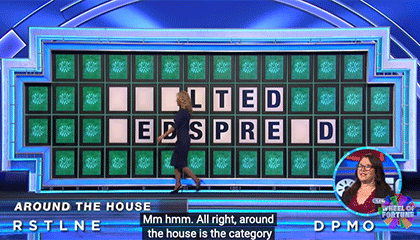 “Anyone who knows me knows why I asked for a broom,” Knebel said. “Because they had vacuums, blowers, the entire crew cleaning up, and I felt so bad. And they said, ‘Come on, congratulations!’ First they brought me a small broom and I said, ‘This will not do. I need a big broom.’ And then they brought me this big broom with WOF on it and they did this closing shot of me.” Knebel was already making gifts to her favorite charities before the show aired and plans to invest the rest to grow so she can continue supporting good causes and helping her children. “I am so grateful to have been chosen as a contestant, especially after trying so many times,” said Knebel of the taped episode before it aired. As a contestant, she was embargoed from revealing the results until after the show. Knebel held a small party afterward with friends and family that featured a shadow box she created secretly with memorabilia she collected about her experience and a Wheel of Fortune game with her winning guess “quilted bedspread” in the game’s miniature puzzle board. At the party and next morning at work, she shared Wheel of Fortune-themed baked treats with everyone. “It’s a lovely memory, something I’ll never do again,” she said.  Although it was her first time as game show contestant, this would be the second time she’s shared the stage with Sajak and White. That happened in 1988, when she was seated in the audience as a guest of her cousin, Peppy Greenberg of Whitestown, Queens, N.Y. “Peppy won multiple days on the daytime show, every puzzle, and she won the bonus round,” said Knebel. “So, she said to Pat Sajak, ‘My cousin Ilene and her husband are here,’ and we ran on stage,” Knebel said. “Peppy was making a video of it and I kind of pulled him (Sajak) into the shot. It’s hysterical. The video is priceless.” “I’m a people person,” Knebel said. “During all this time, you know, these 30 years, I’d see auditions. And I’d try. My girlfriend and I went for ‘The Amazing Race.’ I went to audition for the ‘Price is Right’ once. I went to ‘Let’s Make a Deal’ once. I even did a video for ‘Supermarket Sweep.’ They didn’t call me either. “I tried for ‘Wheel of Fortune,’ I think it’s got to be five or six times, because I wrote it down,” she said. “You just need to look upon it as having fun. To get down on yourself is not really good. They need a diverse cast and might have already found someone looking like you.”  She persevered and eventually uploaded a video to WheelofFortune.com. That online application process involving puzzle solving skills and virtual audition to become a Wheel of Fortune contestant with the promise of $1,000 just for appearing on it. In March, Knebel picked up on a random phone call that turned out to be a Wheel of Fortune representative, letting her down about the 2021 season but assuring her, “We’ll get you in next season.” She got the call to set it up in October. Knebel has always had her eyes on the glitter of showbusiness. In college, she took part in several theater productions. After writing and producing commercials for ABC affiliate Channel 10 in Albany and working with the Capital Repertory Company in Albany, she headed to Southern California in a 1966 red Mustang convertible with her old college bestie, Maureen O’Connor ’84. Her Hollywood dreams turned into a first marriage and family and a more settled job in public service administration, where she’s moved between several city departments and is now in Beverly Hills Department of Public Works. She currently lives in Los Angeles, California, with her second husband, Kyle. To Knebel, everything about her life, from her college major to her job involving writing and reading words all day, to her leisure life, prepared her for this game show. “It used to drive my kids crazy, but when we would go on a long trip, I would always be reading signs,” Knebel said. “You just see how words are put words together. Then I’m always watching old clips of the show. And there’s an app for Wheel of Fortune that I have on my phone. It’s just another way to practice.” Orientation sessions to begin June 24The Orientation Committee will begin welcoming new students and their families for student orientation and advisement beginning Friday, June 24. All new students were invited to select an in-person or online synchronous one-day orientation program. These program options are provided to balance the safety and wellness of all involved with an opportunity for students and families to be engaged. Students will be required to be compliant with our COVID-19 vaccination policy before signing up for an in-person Orientation session. Attendance will be limited for each date to decrease density at in-person events. Specific dates are listed below. Transfer Session 1: Friday, June 24 (online) First-Year Session 1: Tuesday, June 28 Transfer Session 2: Wednesday, June 29 First-Year Session 2: Thursday, June 30 First-Year Session 3: Wednesday, July 6 Transfer Session 3: Thursday, July 7 First-Year Session 4: Friday, July 8 First-Year Session 5: Monday, July 11 First-Year Session 6: Tuesday, July 12 First-Year Session 7: Wednesday, July 13 Transfer Session 4: Thursday, July 14 First-Year Session 8: Monday, July 18 (online) Transfer Session 5: Wednesday, July 20 (online) First-Year Session 9: Friday, July 22 (online) Remember to welcome new students and families that are visiting campus during Orientation. Various offices and departments work together to make these events a success and to aid our new students in their transition to SUNY Cortland. The campus community is invited to participate in these programs. For program information, refer to the Orientation website at cortland.edu/orientation. Direct questions about the Orientation program to Marinda Souva in Advisement and Transition.  Suggest a feature story Suggest a feature story
Faculty/Staff ActivitiesChristina KnopfChristina Knopf, Communication and Media Studies Department, had a chapter titled “AfterShock’s Rough Riders and the Reification of Race Reimagined,” published in the anthology Drawing the Past (Vol. 1): Comics and the Historical Imagination in the United States, from the University Press of Mississippi. The essay argues that though speculative histories purportedly challenge historical record and accepted limits of physical and social worlds, an alt-history founded on an aesthetic of capitalist and colonial violence (steampunk) will be restricted in its ability suggest new visions of equity and inclusion. Keith NewvineKeith Newvine, Literacy Department, in collaboration with Sarah Fleming, was awarded a grant from the Abolitionist Teaching Network, which awards grants to those who strive to disrupt inequalities and injustice within their schools, communities or both. The funds will be used to purchase class sets of young adult texts written by and about people of color that are loaned to school districts in Onondaga County and Cortland County to introduce and reinforce the Abolitionist Teaching Network’s commitment to culturally and historically responsive education. After students and teachers engage in this antiracist literacy work, students will become Antiracist Ambassadors who engage in courageous conversations with students and educators from other high schools in Onondaga and Cortland County about the ways in which white supremacy is demystified, dismantled, and decentered in these texts and amplify the culturally sustaining and joyful counternarratives written by these authors and realized by these texts.  Submit your faculty/staff activity Submit your faculty/staff activity
In Memoriam Doris Albro, senior computer operator, died on Dec. 17, 2021. Mark Connell, senior assistant librarian emeritus, died on Feb. 3, 2022. Scott Suhr, laboratory animal caretaker, died in 2021. Bard Van Woert Prentiss, associate professor of art and art history emeritus, died on Nov. 20, 2021. |
The Bulletin is produced by the Communications Office at SUNY Cortland and is published every other Tuesday during the academic year. Read more about The Bulletin. To submit items, email your information to [email protected]
© 2026 SUNY Cortland. all rights reserved.